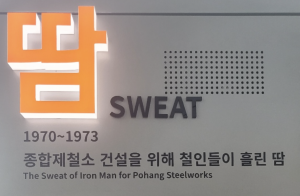Pohang: POSCO Museum
Photo essay of wall text of POSCO Museum of Pohang

Photo essay of wall text of POSCO Museum of Pohang

XXX

The narrative in this film is an emotional one, rather than a scientific one. For the most part, scientific knowledge is common, as the outbreak occurred recently. The only scientific information given was at the end where the statistics of how many deaths occurred in Liberia are given as well as the amount of people who contracted the disease. The primary appeal of this film is that it plays into people's emotions. The narrator is a student at the University of Wisconsin, who discusses his struggle with getting his family to the United States and out of the infected areas. Through graphic footage, as well as this story and narratives from people within the community, we are given an emotional framework with which to empathize.
Emergency response is not addressed in this article. This article could be of interest to medical responders, however, because it helps to give insight on our patient's suffering.
They are shown for a moment in which they bring in trauma patients, but are not a main player in this documentary.
According to ResearchGate, this article has been cited 28 times.
This article was written by Miriam Ticktin, and Associate Professor of Anthropology and Co-Director of Zolberg Institute for Migration and Mobility at the New School. She received her PhD in Anthropology at Stanford University and the Ecole des Hautes Etudes en Sciences Sociales in Paris, France, and an MA in English Literature from Oxford as a Rhodes Scholar. Before coming to the New School, she was an Assistant Professor in Women’s Studies and Anthropology at the University of Michigan, and also held a postdoctoral position in the Society of Fellows at Columbia University. Her research primarily focusses on the intersections of the anthropology of medicine and science, law, and transnational and postcolonial feminist theory.
While this article does not really address emergency response, the discussion of violent attacks on humanitarian workers does involve emergency responders and can affect how humanitarians provide care. So while not direct, this article does have implications for emergency responders in those regions.